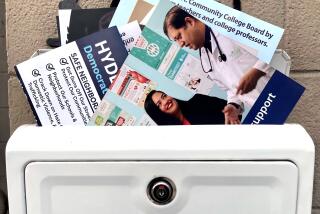How to Get Fewer Ads in the Mail : Billions at Stake Over One of Life’s Little Nuisances
- Share via
The other day a reader from Pleasant Hill, Calif., poured out his dismay over what he sees as one of life’s little nuisances.
“Why not just leave people alone?” he wrote. “Stop making their lives harder. Stop selling their names, for example, so that their mailboxes are stuffed with trash that has to be thrown away.”
Point well taken. But he had best brace himself against the tide. It looks as if direct marketing--loosely defined as an offer made to a consumer without a middleman--is very much on the rise.
Robert J. Coen, a senior vice president who tracks advertising industry growth for the McCann Erickson Inc. advertising agency in New York, says that direct mail advertising for 1984 will show a 14% growth over 1983 when the final figures are in. And since 1984 was a record year for advertising--with billings by U.S. agencies estimated to top $87 billion--the amount spent on direct mail (a projected $13.4 billion) will also break records.
Buyers Spend Billions
Why the upsurge? Because advertisers are convinced that it works. Roberta Wexler of the New York-based Direct Marketing Assn. (DMA)--a 68-year-old, 5,149-person trade group--notes that in 1983 consumers spent $44.4 billion on goods and services as a result of direct-mail advertising. And, since most direct-mail purchases are not big-ticket items, that figure represents, she says emphatically, “a lot of transactions.” Three of the biggest growth areas: computer products, financial services and political fund raising.
Some of what’s happening inside our friend’s mailbox, of course, is still the blanket blitz of mailings to every household--the classic “junk mail” phenomenon. But the last decade has brought increasing sophistication to the industry, as firms recognize the value of selling to a “target market” of people already thought to be interested in their offerings.
Not surprisingly, the sale and rental of lists of addresses has become a significant income-producer for firms that own them. There are highly specific contracts, overseen by “list managers” and hawked by “list brokers.” They talk, these days, about a “merge-purge” of one list against another--to avoid duplication, and to locate the single woman under 40 who not only lives east of the Mississippi and shops regularly at Brooks Brothers but who is also a member of the fine arts museum and the local tennis club.
It’s at this point, I guess, that I begin to sympathize more deeply with our friend. I suppose if I had one of those cavernous rural mailboxes beside a dirt road somewhere, I might not mind. A single letter might look rather lost, sitting in there all by itself. How much nicer to surround it with all those slick catalogues. And how much easier, being so far from the stores, to do my shopping beside my fire.
But I have one of those tall, narrow mailboxes mounted in gangs in urban buildings. It hardly holds four letters and a paper.
Stopping the Flood
But I suspect that our friend is voicing a deeper concern. Think, for a moment, of his name and address--and yours, and mine--flitting about from computer to computer, being ground and crunched and added and subtracted and bought and sold from coast to coast, just because we once bought something from a catalogue. It gives you the strange sense that someone out there is invading your privacy, discovering all sorts of tastes you didn’t know you had. It leaves one feeling somehow undefended.
Or it would, except for a curious thing offered by DMA--the Mail Preference Service. By contacting them, you can have your name removed from all lists of all their member firms. It won’t cut the flood entirely, says Ms. Wexler, but “it has a noticeable impact on the amount of mail in the mailbox.”
As of the end of 1984, 960,319 people had taken advantage of the service. Lest our friend cheer too wildly over this option, however, he ought to know one last thing. Of those 960,319 people, the majority signed up to have their names added to the lists.
More to Read
Inside the business of entertainment
The Wide Shot brings you news, analysis and insights on everything from streaming wars to production — and what it all means for the future.
You may occasionally receive promotional content from the Los Angeles Times.










